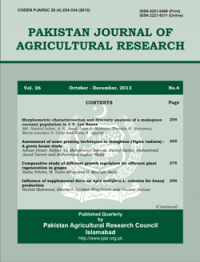Factors Affecting the Willingness to Adopt Biogas System at Small Pig Farms in Mekong Delta, Vietnam
Factors Affecting the Willingness to Adopt Biogas System at Small Pig Farms in Mekong Delta, Vietnam
Budi Guntoro1*, Nguyen Hoang Qui1,2, Ahmad Romadhoni Surya Putra1, Nguyen Thi Anh Thu1,2 and Nguyen Van Vui2
ABSTRACT
Applying biogas is one of the most effective methods to reduce environmental emissions in pig farming. By analyzing the extended technology acceptance model (TAM extended), this study investigated the factors of social profiles, production characteristics, and perception of farmers affecting the acceptance of biogas systems in pig farms. The data showed that occupation, perceived usefulness, information awareness, social influence, and perceived cost were significant predictors of farmers’ willingness to adopt biogas. Specifically, occupation (B = -0.088, p = 0.007) and perceived usefulness also negatively affected (B = -0.149, p = 0.005) the willingness to adopt biogas; in addition, farmers having off-farm jobs or having high perceived usefulness of biogas were less likely to adopt biogas. In contrast, information awareness (B = 0.295, p < 0.001), social influence (B = 0.389, p < 0.001), and perceived cost (B = 0.246, p < 0.001) were positively correlated with biogas adoption. Other variables such as age, gender, experience, education level, production scale, and income did not significantly influence biogas adoption. The study concluded that promoting the willingness to adopt biogas in pig farms requires policy interventions focusing on raising awareness, leveraging social influence, and addressing economic factors related to investment costs and benefits.
To share on other social networks, click on any share button. What are these?







